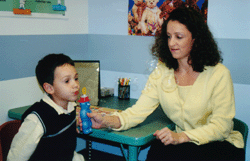|

Speech Therapy should be both fun and beneficial to the children and their parents
|
Gresham Speech Therapy:
Frequently Asked Questions (FAQ)
Q: " Is my child's speech and language normal?"
A: Language milestones vary widely. As a rule though, a typical 2-year-old should have an expressive vocabulary of around 100 words. Children start putting two words together such as "mommy go" or "red car" anywhere between 14 and 28 months. Young children understand the meaning of many words before they are able to produce these same words. At 24 months, a typically developing toddler will understand up to 900 words, and will produce about 9 or 10 different sounds, such as M, P, B, T, and D. As a general rule of thumb, children should be understandable 100% of the time by age 4. However, many children may have some "later developing" sounds that they have not yet mastered, such as R, or TH.
There are "red flags" that may influence speech and language development. These are: family history of speech and/or language delay, frequent recurring ear infections, being male, not having adequate language stimulation or opportunities to communicate, and being born a second or later child.
Q: " Will my insurance cover speech therapy?"
A: Coverage of speech pathology services varies widely. Some insurance carriers will cover speech therapy for a limited amount of time. Many insurance companies provide coverage for communication disorders associated with illnesses or accidents, but often exclude those disorders that have a developmental etiology. It is important that you check with your carrier to determine coverage.
Q: " Are "sippy cups" bad for speech development?"
A: Duck-billed, spouted cups or "sippy cups" can be detrimental to oral facial musculature. While there is no documented research stating this, I have seen an overwhelming correlation in my own practice of prolonged, excessive sippy cup use on poor speech clarity, poor dentition and tongue thrust swallow pattern. Sippy cups are basically a bottle in a different form and this encourages an immature "suckle" swallow pattern rather than a more mature swallow. The use of a sippy cup forces the tongue to a low and forward position. While sippy cups can be useful as a transition tool (i.e. when transitioning from bottle to cup drinking), they should not be used chronically and only because it's convenient to the family, or because the primary goal is to avoid spills.
|


